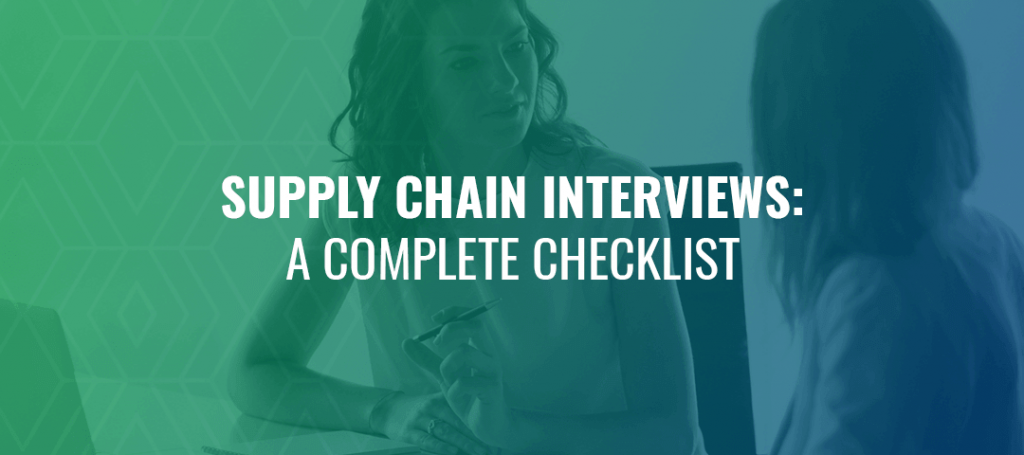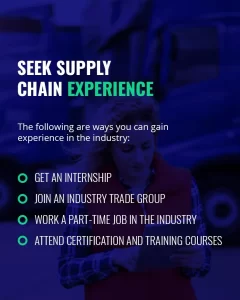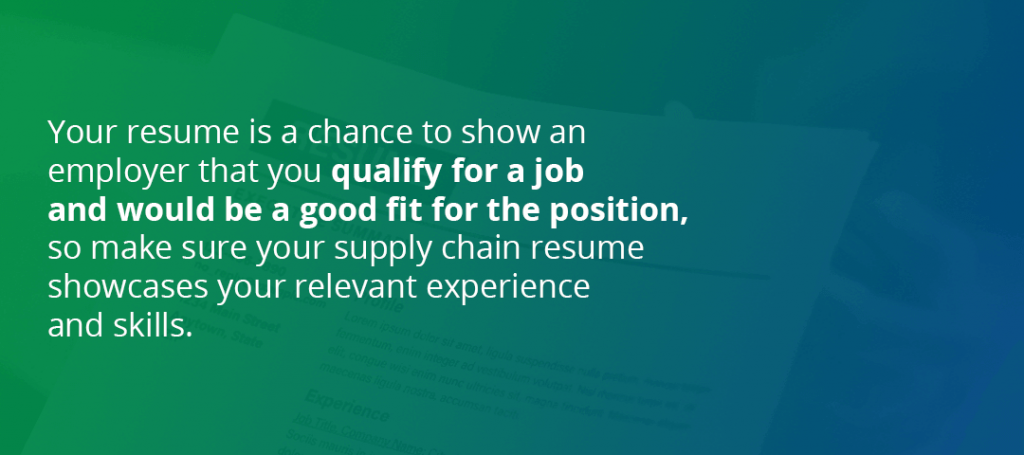
Table of Contents
- What Not To Do
- Analyze The Job Description
- Research The Company & Role
- Seek Supply Chain Experience
- Practice Interviewing
- Interview Day Prep
- Follow Up
- Evaluate The Job Offer
Are you looking to find a supply chain job? There are several steps you can take prior to and following interviews for supply chain jobs that will help you make a great impression on an employer. To help you with the application process and interview preparation, we have compiled a guide to common supply chain interview questions and answers, along with supply chain interview tips. Check out the following information about how to prepare for a supply chain interview for step-by-step guidance on the process.
Things You Don’t Need to Do
When it comes to interviewing for a job, there are some common supply chain interview preparation techniques that may actually be a waste of your time. The following are a few unnecessary things that you don’t need to do:
- Check in too frequently after the interview to ask about their decision.
- Spend too much time creating a resume that is aesthetically pleasing.
- Write a handwritten thank you note rather than an email.
- Arrive more than 15 minutes early.
You can best focus your time on selling your skills to the right supply chain company by avoiding these time-wasters. You can also avoid annoying your interviewer or the receptionist by not checking in too often or showing up too early.
Step 1: Carefully Analyze the Job Description
The first step of supply chain interview preparation is carefully analyzing the job description. The last thing you want to happen during the interview is to be given a question that makes you wish you had examined the job description more closely. The key to avoiding this and ensuring your interview success is to analyze the description of a supply chain job as carefully as you can.
Many of the questions you’re asked in the interview will likely be based on the job description. The interviewer wants to ensure you understand the requirements and expectations of this role and that you are a good fit. This means the better you can understand the description, the better prepared you will be to answer the interview questions.
Use the following tips to analyze the job description carefully and prove to the interviewer you know what is expected of the position:
- Read the job description a few times: To best understand what the company expects from the talent who fills this role, you may want to read the job description a few times. The job description is valuable to tell you about the job, and it can also provide relevant information about the company that you can utilize in your interview.
- Use the job description to prepare relevant anecdotes and examples: While reading through the description, note any of your past successes that demonstrate your ability to complete tasks relevant to this position.
- Use the description to create talking points: Within your supply chain management interview preparation, you can use the job description to create talking points that act as a springboard to help you answer a range of questions.
- Base your questions on the job description: At the end of the interview, you may want to ask the interviewer a few questions about the position. A job description is a great place to start when you are trying to come up with relevant questions.
Step 2: Research
After carefully analyzing the job description, the next step in preparing for a supply chain interview is doing your research. You may want to research both the company and the role you are applying for.
Research the Company
One of the best supply chain management interview tips is to research the company. To do so, you should visit the company’s website, read media coverage about the company and visit the company’s social media pages. This research will help you draw conclusions that can assist you during your interview.
On the company’s website, you may want to look at the About page and the Careers page. The About page will provide an overview of the company, its background and its mission or philosophies. The Careers page will list the positions that are open and the types of roles available.
During your company research, write down notes on the values and mission of the company. How does the company stand apart from competitors? Can you demonstrate how your experience aligns with the company’s values and goals?
You may also want to do a Google search for any press coverage on the company. Write down a note about anything interesting or concerning you may want to bring up during the interview. Next, you can extend your research to the company’s social media accounts. What are customers saying on a company’s social media page? Are customer questions answered quickly, or do most go ignored? Are complaints addressed productively, or are excuses made for the criticisms?
The following are questions about the company you should be prepared to answer in the interview:
- What services or products does our company offer?
- Why do our customers choose our company?
- How many locations does our company have?
- What is the mission of our company?
If you know who will be interviewing you, you may also want to visit this person’s LinkedIn account for any information you can use as an icebreaker.
Research the Role You’re Applying For
The next part of your research should be devoted to the role you are applying for. A supply chain operation offers positions in three different tiers — managers, directors and executives. To ensure everything runs smoothly, candidates in these positions must communicate efficiently. Each role comes with certain expectations and responsibilities.
The following responsibilities are required of a supply chain manager:
- Efficiently address issues that arise
- Train new talent
- Write reports to keep directors and executives updated
- Ensure operations comply with safety standards
The following responsibilities are required of a supply chain director:
- Set goals for their area
- Analyze past reports of performance
- Write routine reports to keep executives updated
- Manage efficiency in their part of the supply chain
The role of a supply chain executive includes the following responsibilities:
- Managing risk
- Reducing costs
- Following and setting regulations
- Hiring directors and managers
- Considering industry changes and trends
You should be aware of the responsibilities of the position you are applying for to ensure you qualify for the position and can handle the responsibilities required.
Step 3: Seek Supply Chain Experience
While you’re preparing and interviewing, you’ll want to gain supply chain experience and make connections in the industry if possible. If you are a recent graduate or you have been working in an unrelated field, you may be wondering how you can break into supply chain management. The following are ways you can gain experience in the industry:
- Get an internship
- Join an industry trade group
- Work a part-time job in the industry
- Attend certification and training courses

When you join a trade group, you can network with other professionals in the industry. These connections can prove valuable to you down the road and may help you get your foot in the door.
Step 4: Practice Interviewing by Knowing Common Supply Chain Interview Questions
The next step to prepare for a supply chain job interview is to practice interviewing. You can prepare and practice your answers to common questions before the interview. Practicing your answers can make you feel more confident and comfortable before and during the interview.
Plan out Your Answers to Common Supply Chain Interview Questions
The next step to prepare for a supply chain job interview is to practice interviewing. You can prepare and practice your answers to common questions before the interview. Practicing your answers can make you feel more confident and comfortable before and during the interview.
Common supply chain analyst interview questions and procurement interview questions may cover your background, your technical knowledge about supply chain operations and how you would act in several different scenarios. Here are some questions you may face during our next interview.
Questions About Your Background
These types of questions usually start the interview out. Even though the employer has this basic information from the candidate’s resume, it’s a good way to develop a rapport between the interviewer and the interviewee.
As the employer, you can ask questions about the relevant experience from past jobs and education. It also gives you a chance to learn more about gaps in employment, why the candidate is seeking new employment and other similar information.
If you’re the interviewee, be sure to give more than what’s on your resume and cover letter. These questions give you a chance to go into more detail and talk about other things that you left off of your resume and cover letter.
How to Explain Why You Left Your Last Job
There are three reasons why you left your previous job – either you quit, you were laid off, or you were fired. If you quit your position, you’re going to want to mention why you quit. Make sure that you emphasize the positive reasons for quitting instead of highlighting any negative reasons if there were any. For example, explaining that you’re looking for new challenges, new experiences or are looking for a different way to pursue your dream job.
If you were laid off, talk about the circumstances. Employers tend to understand that being laid off is often beyond your control, whether it was because your company had to make major cut backs due to the loss of a client or because there was a change in direction of the company’s strategy, to name a few reasons. Some of the most talented and skilled employees have been laid off at one point or another.
If you were fired, you’ll want to be very careful with how you answer the question. You’ll want to explain any extenuating circumstances, but do so without trying to put the blame for your firing on someone else – this won’t look good. In fact, avoid putting the company that fired you down in any way. The hiring manager isn’t going to want to hire someone who might speak ill of the company should they be fired. If you were fired because expectations or requirements changed after you came on, explain this. Make sure you explain what you learned from the experience.
Technical Supply Chain Questions
After those basic questions are asked, the interview typically goes into technical knowledge. Asking about specific methodology, terminology and other industry knowledge lets the employer know that the candidate has the technical knowledge to get the job done. Questions about what certain terms mean, how much different materials cost and other similar questions that are relevant to the specific job are to be expected.
Scenario Questions
The next most common supply chain interview questions are ones that test how the candidate would act in different scenarios. These are great questions to ask because they help show how well the candidate can think on their feet.
There are two types of scenario questions: ones that are completely hypothetical and ones about how candidates actually handled similar situations. Asking how a candidate handled working with a difficult colleague and how they got through a difficult situation are ways to see how the candidate got through a real-life issue.
It’s also helpful to ask questions about how the candidate thinks they would react to a situation they have not encountered before. Questions about emergencies or other scenarios specific to the position are important to ask too.
Tips on Answering These Questions
When you’re preparing for an interview, most people will tell you to practice and prepare answers to possible questions ahead of time. While this does ensure you come up with good answers to some of the trickier questions, it does have one negative consequence — it can leave your responses feeling pretty robotic.
Interviewing successfully for a supply chain position requires more than good answers. Most supervisors are looking for personable, genuine employees. How can you convey your positive personality and also come up with good answers?
- Before the interview, come up with a list of possible questions, and think about how you may answer them if they are asked. Do not, however, rehearse specifically worded answers. You’ll come across as authentic if you pause a few times when formulating the actual response during the interview.
- Don’t be afraid of pauses. It is perfectly okay to stop and think for a second. Pausing doesn’t make you look incompetent; it makes you look thoughtful. Avoid chattering on and on to fill blank pauses.
- Have a friend or family member run through a practice interview with you a few days before the real interview. Among the questions you should ask your practice interviewer following the session are “Did I appear natural?” and “Was my body language comfortable and relaxed?” If your practice interviewer has suggestions for improvement, implement them and practice again.
- Instead of focusing on getting the “correct” answers, focus on your delivery of your answers. You want to come across as passionate, interested, and engaged. Responding naturally to questions rather than reciting memorized answers makes it easier to express your passion for the position and subject matter.
Think of Thoughtful Interview Questions to Ask
You may want to prepare questions you can ask the interviewer at the end of the interview. There is likely some information you want to know that you couldn’t find from the job description or through your research, and the end of the interview is the best time to ask. The following are examples of questions you may want to ask at the end of a supply chain job interview:
- What role will you fill? – The role that you are applying for is much more than just the job title since today many positions are a blend of more than one position. You will be filling a vacant role, which means the company should have a good idea of what they are expecting from the perfect candidate, whether it’s to mentor other individuals on your team, to come up with creative ideas and process improvements or to work within certain parameters and to follow all the rules. Remove rest
- What have your predecessors done to be successful? – This is a great way to figure out what the expectations of your role are. Hopefully, the company will describe some of the positive and negative attributes of your predecessor. You’ll not only be able to compare your own attributes and way of working to what has been expected, but you’ll also get an idea of what the company culture is like.
- What is expected of you within your first three months, 6 months and first year? – You should have an idea of what you are capable of, but find out what the company will expect of you in terms of getting the hang of things and how they work and growing into your role.
- What is the company culture like? – Company culture varies greatly from company to company. Some companies have a very formal company culture in which everyone dresses up for work, shows up on time and gets their work done. Others have a more casual approach where work hours are flexible as long as deadlines are met. Asking about the company culture is important to figuring out if you will fit in as an individual.
- What can you do to make their job easier? – This shows that you want to know why they are hiring and what they are looking for out of the position.
- What is the biggest hesitancy they have about hiring you? – This gives you a chance to understand how they are viewing you as a candidate. It also gives you the opportunity to address whatever issue they might have. For example, if it’s an experience issue, then you could bring up a previous position you excelled at without having had a lot of experience going into that job. If it’s because they think you are lacking a skill, emphasize that you are willing to work hard to lean whatever additional skills are necessary.
- How do they feel about risks and experimentation? – This question shows that you are willing to adapt. Some companies like it when their employees take risks or experiment in certain areas in order to achieve results. It shows initiative. However, some companies prefer that you stick to the proven path and work within the structured environment that they have established.
- Who are their most recent hires? – Find out about some of the other positions that were filled. Follow this up by asking whether some of their hires have worked out or not. This can help you figure out what you need to do in order to be successful if you are hired and it shows the employer that you are already thinking ahead.
This is your opportunity to determine whether the job is a good fit for you, so ask the questions you need to know about the company and the position.
Conduct Mock Interviews
Conducting mock interviews will give you a chance to practice interviewing. By conducting mock interviews, you may feel calmer and better prepared. Conduct the mock interview in the same format as your actual interview. If you will have a phone interview, for example, practice answering interview questions on the phone.
Practice your answers alone, and if possible, with the help of a family member or friend. A friend can ask you questions over the phone or seated at a table. If the interview will be conducted virtually, you may want to practice with the technology and have a friend ask you some of the common supply chain interview questions.
Step 5: Preparation
Your next step includes the final preparation before your interview, including getting directions, preparing your resume and arriving early for the interview.
Get Directions
If you will be interviewing in person, you should know exactly where you are headed beforehand so you can avoid running late. If you are unsure where you are going, use GPS or Google Maps to guide you. Put in the address and determine the best route for you to get to the location. You may also want to check on parking if you believe it may be an issue.
If you have time, you may want to drive to the location the day before your interview. This way, you will become familiar with the route and find out how long it will take you to arrive. You can then add a few minutes to your travel time so you will be able to arrive early on the day of the interview.
Additionally, you may want to confirm the location and time of the interview so you can be absolutely sure that you are heading to the right place.
Resume Preparation
Fortunately, you won’t need to do much preparation for your resume. In fact, it’s best to keep your resume simple. The following are tips to keep in mind when compiling your resume:
- Include your contact information
- List your relevant skills
- Use supply chain sample resumes as a guide
- Include your soft skills
- Utilize white space
- Focus on the specific details of your skills
- Use keywords
- Review your resume for errors, repetition and typos
Your resume is a chance to show an employer that you qualify for a job and would be a good fit for the position, so make sure your supply chain resume showcases your relevant experience and skills.
Arrive Early
You may want to plan to arrive 10 to 15 minutes before your interview. This will give you enough time to find the office or lobby, freshen up if needed, read your notes and take a few deep breaths.
Call as soon as possible if you know you will be late because of unavoidable circumstances, such as traffic from a car accident. On the call, apologize and ask if you can still attend your interview. If you’re unable to keep the interview, ask how you may be able to reschedule.
Step 6: Follow Up
The next step on the checklist is following up after the interview. Following up gives you the opportunity to ask additional questions, to be remembered by the hiring manager and to demonstrate your professionalism. Following up after a supply chain interview can show your interest in the position. Below are tips to keep in mind when following up after your interview:
- Send a thank you note via email as soon as possible: Send a thank you email within 24 hours of the interview. If you had an interview in the morning, you may want to send your email in the afternoon. If you had an interview in the afternoon, you may want to send your email the next morning. This is a chance for you to demonstrate your professionalism and punctuality.
- Focus on the concerns and needs of the interviewer: Thank your interviewer for their time. Let the interviewer know you are ready to perform the duties of the position and how you can contribute to the company.
Even if you believe the interview went poorly, send a thank you note. The interviewer may believe the interview went well and the email may set you up for positive interactions with this person in the future.
Step 7: Evaluate the Job Offer or Ask for Feedback
If you recieve a job offer after your interviews, the final step in the process is evaluating the offer before you accept it. There are more jobs available in the supply chain discipline than there are qualified candidates who can fill them, which means you are a sought-after candidate. Knowing how to evaluate a job offer is crucial in determining whether accepting an offer is the right professional move for you.
Consider the following before you accept a supply chain job offer:
- Use an online calculator to determine your professional worth.
- Learn about the benefits package the company offers.
- Research the company’s reputation and culture.
- Find out what additional perks are offered.
- Determine the minimum amount of compensation you are willing to accept.
- Find out if you will receive matching contributions from the company for your retirement account.
Will this position allow you to develop new skills and help you grow professionally? Will this position allow you to maintain or improve your current work-life balance? Will you need to relocate? Only you can examine the full picture and determine if a supply chain position is right for you.
Alternatively, if you are rejected for a job, you may want to ask for feedback. This feedback is not intended to address the exact reasons you were rejected for a job. It is instead meant to help you better yourself. Asking for feedback following a rejection can allow you to:
- Learn about yourself
- Get closure
- Grow from your mistakes
- Open the door for future opportunities
A few of the questions you may want to ask after being rejected for a job position include:
- Am I missing experience, qualifications or skills?
- Can you provide any feedback on my resume or cover letter?
- What are one or two things I could have done better in my interview?
You can request feedback via phone or email. If you receive the rejection during a phone call, this may be the best time to ask for feedback. If you receive the rejection in a voicemail, you may want to request feedback no later than a day after you received the voicemail.
If you choose to ask for feedback via email, you should send the email within a day. If you wait longer than a day, the recruiter or interviewer is less likely to be able to provide you with detailed feedback. Requesting feedback in person is not recommended unless you already have a relationship with the person from whom you are seeking feedback.
If you have decided to ask for feedback, consider who you should seek this feedback from. For example, if you received your rejection from the hiring manager, you can respond to the manager. If you are unsure how to request feedback following a rejection email, you can contact the last recruiter you spoke to.
Find Your Supply Chain Position With Optimum Supply Chain Recruiters
At Optimum Supply Chain Recruiters, we can help you kickstart the career you’re seeking in the supply chain discipline. We can provide you with the opportunities you may not be able to find elsewhere. We work with businesses in the supply chain discipline that are in need of qualified candidates for job positions, many of which are not advertised publicly.
Want more information on supply chain manager positions and other opportunities? For access to these opportunities, submit your resume to us online at Optimum Supply Chain Recruiters today.







